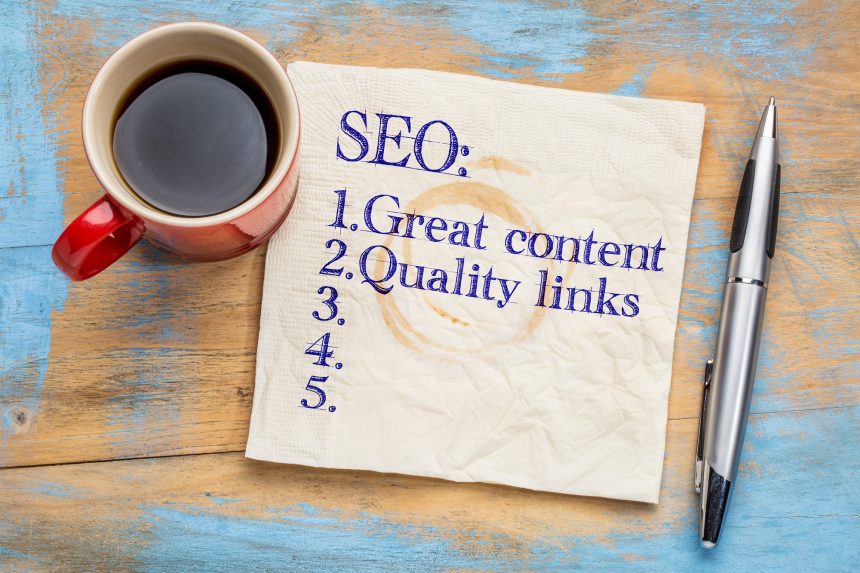SEO, also known as search engine optimization, is one of the most important aspects of online marketing. In fact, over 70% of marketers consider SEO as a more effective form of marketing than PPC.
- How Does SEO Work?
- On-Page SEO
- Off-Page SEO
- How to Build SEO Strategies
- Know Your Industry Keywords
- Share High-Quality Content
- Optimize Your Website for Mobile Devices
- Improve Your Website’s Loading Speed
- Fix Broken Links on Your Website
- Build Quality Backlinks
- Don’t Forget Page Titles and Descriptions
- Enhance Your Site’s User Experience
- Hire an Expert for Assistance
- Consider Local SEO
- Benefits of SEO
- Build SEO Strategies That Work
That’s because it can help your business rank higher on search engine results pages (SERPs). Hence, your potential customers are more likely to find your website and buy your products and services.
However, SEO can be complex and overwhelming for small businesses and start-ups. This is why companies need to build SEO strategies to better market their brands.
In this guide, we will walk you through everything you need to know about SEO and how to build effective strategies for your business. Read below for more information:
How Does SEO Work?
Before diving into building an effective SEO strategy, it’s essential to understand how SEO works. Search engine optimization is the process of optimizing your website to rank higher on SERPs.
To do this, businesses need to focus on two primary ranking factors:
On-Page SEO
This refers to all the measures you can take on your website to improve your ranking. It includes everything from your website’s design and content to technical SEO factors like site speed and website structure.
There are many things you can do to improve your on-page SEO, including:
- Optimizing your title tags and meta descriptions
- Optimizing your images for search engines
- Adding keywords to your content
- Creating informative and keyword-rich blog posts
- Improving your website’s loading speed
- Fixing broken links on your website
There are plenty of other on-page SEO tips you can find online. But, the most important thing is to make sure you’re optimizing for your target keywords.
You can use tools like Google AdWords Keyword Planner and Kwfinder to help you find the right keywords for your business.
Off-Page SEO
Off-page SEO is the process of optimizing your website’s online presence. This may include link building, social media optimization, and reputation management.
One of the most important aspects of off-page SEO is link building. You need to build links from high-quality websites to improve your ranking. You can do this by creating informative blog posts that include a link that leads back to your website, participating in industry forums and Q&As, and guest posting on other high-quality websites.
How to Build SEO Strategies
Now that you understand how SEO works, it’s time to build your SEO strategy. Below are several steps to help you do this:
Identify Your Business Goals and Objectives
The first step to an effective strategy is identifying your business goals and objectives. What are you hoping to achieve with SEO?
Do you want more website traffic? Higher conversions or more leads? Answering these questions will help you understand your marketing objectives.
Once you know what you’re aiming for, you can create a strategy that focuses on those goals.
Know Your Industry Keywords
To create an effective SEO strategy, you need to research your target keywords. Keywords are the terms and phrases your target market uses to find companies that offer our services online. Your strategy will likely fail if you don’t know what keywords to target.
You can use tools like Google AdWords Keyword Planner and Kwfinder to find the right keywords for your business. It would help if you also put yourself in the shoes of your potential clients.
What words would you use to find solutions to your problems? For example, if someone is looking for allergy medication, they are likely sick and facing some allergic reaction to something. If you are selling allergy medication, start by searching for the best allergy medication near you.
Check the sites that pop up and the type of phrases they use. Once you know the right Keywords, ensure you use them for your SEO content.
Share High-Quality Content
One of the most important aspects of SEO is publishing high-quality content. This means creating informative and keyword-rich blog posts, articles, and other forms of content.
Your content should be well-written, accurate, and engaging. And it should also include your target keywords to improve your ranking.
You can also use infographics, videos, and podcasts to publish high-quality content on your website. Make sure you distribute your content through social media channels for even more exposure.
Optimize Your Website for Mobile Devices
Since over 60% of internet users access websites from their mobile devices, you must optimize your website for mobile use. This includes using a responsive design or creating a separate mobile version of your website.
Your website should be easy to navigate and include all the same features as the desktop version. If you’re not sure if your website is mobile-friendly, you can use Google’s Mobile-Friendly Test tool to check.
Improve Your Website’s Loading Speed
Another important ranking factor is your website’s loading speed. A slow website will frustrate users and hurt your ranking.
You can improve your site’s loading speed by optimizing images, using a content delivery network (CDN), and minifying code on your site. You can also use SEO software tools to test your site’s speed and find ways to improve it.
Fix Broken Links on Your Website
Broken links are links that lead to pages that no longer exist. These can hurt your ranking and frustrate users. That’s why it’s essential to fix any broken links on your website as soon as possible.
To find broken links on your site, you can use tools like Screaming Frog and Xenu Link Sleuth. Once you’ve found the broken links, redirect them to relevant pages on your website or delete them entirely.
Build Quality Backlinks
You need to focus on building quality backlinks to improve your ranking. A backlink is a link from another website to yours.
Search engines see these links as votes of confidence in your content. The more high-quality backlinks you have, the better your chances of ranking higher in search results.
To build backlinks, you can create great content and share it on social media. You can also reach out to other websites in your industry and ask them to link to your content.
Don’t Forget Page Titles and Descriptions
Page titles and descriptions are also crucial for SEO. They help search engines understand what your page is about, which can improve your ranking.
Make sure your titles and descriptions are accurate and keyword-rich. You should also ensure that your H1 and H2 titles are exciting and captivating for your target market.
When creating titles and subtitles for your content, ask yourself what the users will benefit from reading it. Why should your readers care about your content? Once you answer these questions, it will be easy to create a fun, attractive, and engaging title.
Enhance Your Site’s User Experience
Focus on enhancing your site’s user experience. This includes making it easy for users to find what they’re looking for and navigate your website.
You can do this by creating an easy-to-use navigation menu, using search boxes, and adding helpful features like breadcrumbs. You should also make sure all your pages are mobile-friendly and load quickly.
Hire an Expert for Assistance
If you’re unsure how to build your SEO strategy, consider hiring an expert. An experienced professional can help you create a plan tailored to your specific needs and goals.
A reputable SEO company will check your digital marketing campaign and audit your website to check its performance. They will check for everything that’s dragging your site down and develop a comprehensive report. Then they will use this data to create an effective strategy tailored to your business.
Consider Local SEO
If you’re targeting a local market, you need to focus on local SEO. This includes optimizing your website for local keywords and listing your business in online directories.
You can also add your location to your titles and descriptions to improve your ranking in local search results. This helps your local audience easily find your business online.
Benefits of SEO
Marketing businesses online using SEO and social media isn’t an easy process. It takes time, effort, and a lot of patience. Finding the perfect SEO strategy for your business involves a lot of trial and error.
However, the results are worth it. Below are the benefits of SEO marketing everyone should know about:
- Increased website traffic
- Improved brand visibility
- Higher conversion rates
- More leads and customers
- Greater online presence
SEO should be a part of your overall digital marketing campaign. It’s an effective way to improve your website’s ranking in search engines, resulting in more website traffic and customers. If you’re not sure where to start, the tips in this guide will help you get started.
Build SEO Strategies That Work
These are just a few ways to build SEO strategies for your small business. If you need help getting started, contact a digital marketing agency specializing in SEO. They will help you create a customized plan that fits your needs and budget.
SEO can be complex and time-consuming, but it’s worth it if you want to improve your online visibility and draw more traffic to your website. With the right strategy, SEO can be a powerful tool for your business.
For more informative marketing content, check out our blog posts.














